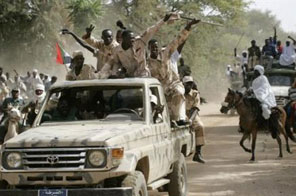AU towards ending Darfur crisis
ABUJA: African leaders on Thursday started combing through proposals on how to resolve a six-year conflict in Sudan's western Darfur region that has claimed up to 300,000 lives and displaced millions.
Several heads of states who sit on the African Union Peace and Security Council are studying recommendations drawn up by a seven-member high-level AU panel led by South Africa's former president Thabo Mbeki.
The team, which was mandated to critically examine the situation in Darfur, has recommended the creation of a hybrid court comprising Sudanese and foreign judges to try those suspected of committing crimes against humanity in Darfur, according to briefing notes distributed at the summit.
It also suggests that a truth and reconciliation commission be established and consider reparation for losses incurred during the ongoing conflict.
The UN says up to 300,000 people have died and 2.7 million fled their homes since ethnic minority rebels in Darfur first rose up against the Arab-dominated government in Khartoum in February 2003.
The Sudanese government disputes the death toll saying 10,000 people died.
Sudanese leader Omar al-Beshir, who faces an international arrest warrant for war crimes and crimes against humanity arising from atrocities committed in Darfur, has skipped the Abuja summit. International and local rights groups had called for his arrest had he landed in Nigeria.
In his opening address, the AU commission president Jean Ping called on "the people of Sudan to hold their leaders accountable for the future of the their country". Ping admitted that implementing the recommendations of the report would be "by far the hardest" part of the exercise, since "Darfur is riven by mistrusts".
"We hope and expect that the summit will give a stronger leadership and clearer direction to the efforts by the international community to bring peace, reconciliation, justice and democracy to Sudan," Ramtane Lamamra, the AU commissioner for peace and security told AFP, before the talks opened.
Mbeki told the leaders that the Darfur crisis "should be resolved as a matter of urgency".
The heads of states are also expected to discuss the crises in Niger and Guinea, at the request of the regional grouping Economic Community for West African States (ECOWAS), according to Lamamra.
The AU had given Guinea's junta leader Captain Moussa Dadis Camara until October 17 to make a written pledge not to stand in the January presidential election, as per his promise when he seized power following the death of long-time strongman Lansana Conte. Failure to do so was going to attract sanctions on the bauxite rich west African country.
But Camara has said he wants the issue of his standing in presidential polls to be taken up for international mediation.
At least 157 unarmed activists demonstrating at Camara's apparent about face on the vote were gunned down by government soldiers at a Conakry stadium on September 28.
Over 1,200 were injured, including women raped by the soldiers.
Uranium-rich Niger has also been a thorn in the flesh of the African Union in light of President Mamadou Tandja's resolve to cling to power for an additional three years after his 10-year tenure ends in December.






